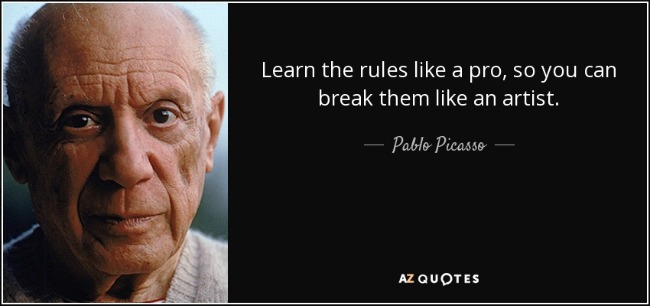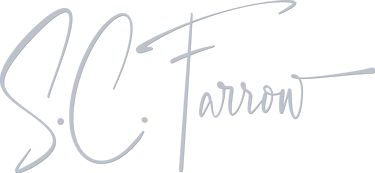
So, You Want to be a Creative Writer
When George Orwell wrote about why he writes, he said, "from the very start my literary ambitions were mixed up with the feeling of being isolated and undervalued". And it's a sentiment that I share.
WRITING
S.C. Farrow
11/29/202210 min read


Pablo Picasso was one of the world’s greatest artists, and his quote about learning the rules before breaking them applies to authors just as much as it does to visual artists. The universe of fiction writing is vast; however, it also follows rules and laws that are not dissimilar to those rules and laws that we take for granted in the physical universe around us. Knowing something about these rules and laws will make your entrée into the world of fiction writing easier, more knowledgeable, and less stressful than it would be if you were ‘winging it’.
WHY DO YOU WANT TO WRITE?
When George Orwell wrote about why he writes, he said, "from the very start my literary ambitions were mixed up with the feeling of being isolated and undervalued". And it's a sentiment that I share.
He also said he wanted to "write enormous naturalistic novels with unhappy endings, full of detailed descriptions and arresting smiles, and also full of purple passages in which words were used partly for the sake of their own sound".
I wanted that, too. So much so, that trauma fiction is the focus of my PhD research studies.
Anthropologists tell us that storytelling is fundamental to human existence and that it’s an activity common to every human culture on earth. More so, it’s an interdependent exchange of information (which we learned to navigate in infancy) between the storyteller and the listener.
Stories help us to make sense of the world we live in, and to share our experience and understanding of that world with our fellow human beings. They help us to know that wherever we are and whatever our experience of the world we are not alone.
Stories are structured around, and are built on, recognisable patterns, and it’s in those patterns that we find value and meaning. Stories and storytelling are important because they're the way humans have evolved to learn. Stories invite connection. They invite us into other people's lives and minds. They introduce us to problems and show us potential solutions.
Stories elevate us above all other life forms on this planet. Stories educate us and entertain us. We need them. And we need the people who tell them.
Whether you’ve ever written creatively before or not, you should be asking yourself why you want to write. Why do you want to make up stories? Why do you want to pursue writing as a form of communication and self-expression, whether that’s on an amateur or professional level? Why do you feel the need to make up stories when there's surely enough drama going on in your real life?
It might be one of the most important questions you will ever ask yourself. But why is it that important? I’ll tell you why - because writing is hard and there will be days when no one, not even yourself, will believe you can do it.
Maybe you’re passionate about writing romance stories or zombie horror stories, but before you put pen to page, there’s a few important questions you should ask yourself:
Who am I to write this story?
Who will read my story?
Is there room for one more romance/zombie/outback thriller in the marketplace?
As a creative writing teacher, I’ve asked hundreds of students to write about the exact same topic and every single one of them has viewed it and approached it differently. So, no matter what the topic, or how many times authors have written about it in the past, your book will be different simply because your perspective will be different. No one else will write a book the way that you will write it.
However, no matter where you are in your writing career, novice, apprentice, or journeyman, it’s unlikely that everyone you know is going to be supportive of your writing efforts. Maybe you’ve started dozens of projects but never finished any of them. Maybe your friends and family indulge you but secretly wonder if you're wasting your time. Maybe you’ve wondered if you’re worthy of being a writer or if you’re simply wasting your time.
So, why do you want to write? Don’t worry, you don't have to have all the answers right now. If you won’t know why you want to write, that’s okay, the answer will come as you explore the craft. And when it does, your work will take on new meaning and possibility. Here is a list of possible answers (which is by no means exhaustive):
You want to write for others. You've learned something and want to share the experience.
You want to write for yourself. It's cathartic. It relieves stress. You can pour your heart out onto the page and no one will judge you for it.
You want to write for fun. That's great, writing is fun. You'll definitely learn something new about the world, and maybe even something new about yourself.
You want to write for art's sake. That's great. Creative writing is art. Art is beautiful. And beauty can even be found in ugliness.
You want to write to express your grief. Pain and sorrow need to be expressed. They need somewhere to go. Writing gives us a chance to give our pain voice enough to heal.
You want to write so you can make money. Fantastic. However, remember that it will take time to build your career as a writer. Many writers work as freelancers which means that paid work can be inconsistent. It's not impossible to make money, but don't count on getting rich overnight.
You want to write because you're looking for a new hobby. You wrote some stuff a few years ago and it was pretty good, so you thought you'd give it another try.
BECOMING A WRITER
I’m a writer. I am a writer. I am a writer. I am a writer.
Regardless of where you put the emphasis in this sentence, can you say it? Can you call yourself a writer? Do you call yourself a writer?
As well as fiction authors, those who write professionally are bloggers, journalists, non-fiction writers, tender writers, speech writers, technical writers, ghost writers, screenwriters, lyricists, and copywriters. Essentially, anyone who engages in the process of writing, whether that writing has been published or not, is technically a writer.
So, how is this different from being an author? Technically, an author is someone whose work has been published. However, in addition to producing published work, writers who develop original ideas and content for their written work are also considered to be authors. For example, people who write academic papers and blog articles are authors. Professional writers have a routine that they stick to habitually. They have to stick to it; they’ve got deadlines to meet and bills to pay, so they have to get to work - whether their muse has shown up or not.
Some find they write best in the morning, some write best at night, some read the news or their horoscope before getting to work, and some like to write haiku as a warm-up. Some writers can only find time on the weekend, or a couple of nights during the week. Many writers say they don’t have time to write regularly, so they just write snippets here and there. If this works for you, that’s fine; however, the reality is that working this way makes it difficult to achieve your goal, or to finish anything.
Consider your dedication to the craft of writing and how important it is to achieve your goals. If you’re passionate about completing a great short story (or even a novel), then you must adopt the mindset of making time to write rather than snatching time here and there. To become a productive writer and to actually finish your projects, you need consistency and routine.
Whatever your situation, try to develop a routine that fits your lifestyle, and stick to it. Here’s a list of tips for establishing your writing routine:
Work on one project at a time. It’s hard enough trying to finish one project let alone multiple projects.
Create a dedicated writing space. This might be a full office in your home, or it could be a corner in the kitchen or a bedroom, it doesn’t matter. What matters is that it’s comfortable and that you’re able to go there and escape the outside world in order to enter your fictional world.
When you sit down to write, make sure there are no distractions. There is nothing more detrimental to your productivity than external distractions, so make sure there are no kids, no mobile phones, and no Facebook or Twitter. Close the door to your space. Put your headphones on if you need to. Your space should be a sanctuary that allows you to focus on nothing but writing.
Set a goal for your writing sessions. For example, your goal might be to write 300 words. Or 500 words. Or it might be to edit what you wrote the day before and then write 300 words. Maybe it’s to solve a plot problem or a character problem. (Note: some writers don’t like to set word counts and that a better measure of their productivity is the quality of their output that day. This is a perfectly valid goal for your writing session.)
Don’t compare yourself to others. Understand that exceptional writing is a craft that develops over time, practice, and an insane amount of patience. It isn’t something you can master in a week or after writing one book.
It is possible to train yourself to be ready to write as soon as you sit down at your desk and complete your pre-writing rituals. The important thing is that you stick to your writing schedule, whether it’s one day a week or every day of the week.
When you write, you bare your heart and your soul and make yourself vulnerable. You open yourself up to criticism. More than that, you invite it. If you want to be a writer, you must be prepared to face negative criticism. You must be prepared to face other people's opinions. If you’re not prepared for this, that’s okay. You might simply like to write for own enjoyment.
Part of becoming a creative writer is developing a writer’s mindset.
When you first embark upon your writing journey, it might be difficult for you to say, “I am a writer”. Honestly, it might be a long time before you are ready to do so. On the other hand, you might be comfortable telling yourself this in the privacy of your own home, but are you comfortable describing yourself as a writer to other people? Can you say it in public?
Your friends and family might have scoffed when you told them you wanted to be a writer. Or maybe you haven’t told them at all because you fear the way they might react. That’s understandable. At the beginning of your career, you won’t have anything to show, and you won’t have any details when people ask those inevitable questions.
What are those inevitable questions? It’s usually always some variation of: 1) What do you write? and 2) What have you written?
This can be confronting if you’re not prepared for it. And some questioners can be brutal in their probing of your experience.
Being a writer isn’t just about putting words on a page. It’s about developing a mindset—the mindset of being a writer. Practice saying it. Practice saying to yourself, “I am a writer.” The more you say it, the more real it will become for you, and the more impetus you will have to actually sit down and write.
Some people have the confidence to announce their calling in public, and that’s great. But not everyone has the confidence to do that. If you know you’re not prepared to deal with the inevitable questions, it might be best to avoid outing yourself in public - at least until you have something to show for it.
Then, when you do have something to show for all your hard work - a published short story or novel - then go for it. Announce your vocation to the world and wear the appellation with pride.
WHERE TO START
Writing exercises are a great way of flexing your writing muscles. If you’ve never written creatively, or haven’t written for a while, your creative writing muscle might need a little strengthening.
And when you’ve been writing for a long time, there’s always a danger of falling into repetitive patterns. That’s where writing exercises can help. Writing exercises can serve several useful purposes, including:
To hone a particular skill (e.g., description, dialogue, or character development)
In preparation for writing something larger (i.e., a project, story, or scene)
Flexibility and daily upkeep
Bring a sense of freshness to your work by practicing new techniques and styles
Because they’re fun.
Here’s a brief list of writing exercises you might like to try:
Writing prompts: these can be anything from a concept, a theme, a picture, or a random sentence. There are dozens (if not hundreds) of websites that provide writing prompts. There are also writing prompt books if you prefer hardcopy.
Journaling: journaling is a very popular method of maintaining your creative writing muscle. There are no rules to journaling, no right or wrong way to do it and for many of us, writing down our thoughts about our own lives can be cathartic. It can also help you to see and analyse writing blocks or other writing challenges.
Haiku: who doesn’t love haiku? Traditional haiku is a three-line, beautiful descriptive form of Japanese poetry that follows a 5-7-5 syllable pattern and is intended to be read aloud in one breath.
Side-step: this is when you take a little side-step with a current work in progress. For example, you might write a couple of paragraphs in a different point of view, try a different style to describe setting, or interview one of your characters. Essentially, it’s a bit of a deep dive into a story element that you may or may not end up using in your work in progress.
Free writing: this exercise is a great way to ‘free your mind’. Simply grab a pen and paper, set your alarm for ten minutes, and then just write. It doesn’t matter what you write, and don’t worry about spelling or punctuation or theme. Don’t censor yourself in any way. It’s like pulling the cork out of a bottle… Just sit down and let the words flow out.
For many authors, writing is a lifelong pursuit where a daily life of pain, struggle, and rejection is punctuated by brief moments of joy and success.
There was a period in Charles Bukowski’s life where he didn’t write for ten years. And engraved on his gravestone are the words “Don’t try”. Watch the video below to find out why.
Creative fiction
Creative writing
Creative story writing


© 2026. All rights reserved
In the spirit of reconciliation, we acknowledge the Traditional Custodians of Country throughout Australia and the Torres Straight Islands and their connections to land, sea, and community. We pay our respects to elders past and present and extend that respect to all First Nations and Torres Strait Islander peoples today.
ABN: 19 569 432 238





